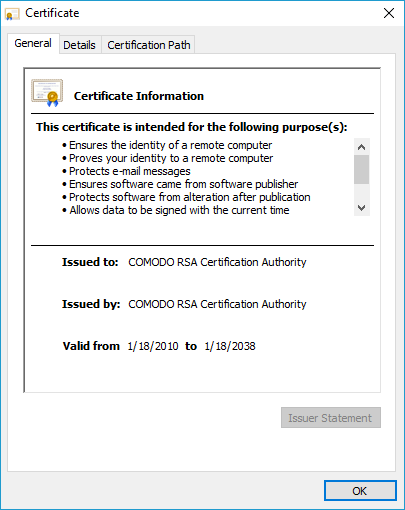The COMODO RSA Certification Authority is one of the most widely distributed root CAs in the world. Its certificates form the foundation of security for millions of websites, applications, and digital services. But what makes COMODO RSA Certification Authority one of the most trusted names in web security? Let’s explore.
Overview of Comodo RSA Certification Authority
If you scan the list of trusted roots in any modern browser, you’ll still see “COMODO RSA Certification Authority.” That familiar name belongs to the primary RSA root, first generated by Comodo CA back in 2010 and now operated by Sectigo (Comodo rebranded in 2018). The file name never changed because root keys are essentially “hard-coded” into operating systems and browsers; renaming them would break the chain of trust.

Foundation of the chain. Every Comodo or Sectigo-branded TLS certificate whether it’s DV, OV, EV, wildcard, multi-domain, or even a code-signing or S/MIME cert ultimately chains up to this 2048-bit RSA root. Keeps the root undisputedly trusted, and every leaf certificate inherits that trust.
Ubiquitous trust store coverage. COMODO RSA root ships with all major desktop and mobile OSs, from Windows and macOS to Android and iOS, plus virtually every mainstream browser. That universal distribution is why servers secured with a Sectigo certificate “just work” across millions of devices.
Massive deployment scale. Sectigo reports more than 57 million active certificates and well over 1000 million issued since inception, making this one of the most widely deployed public roots on the Internet.
Broad product ecosystem. Beyond standard TLS, the same root anchors specialized offerings such as code-signing, document signing, and private CA services, allowing organizations to consolidate PKI under a single, globally trusted umbrella.
Long-term stability. The root’s current validity extends to 2038, and Sectigo has parallel ECDSA intermediates in place to support modern cryptography without forcing customers to change roots down the road.
The COMODO RSA Certification Authority remains a key root certificate in Sectigo’s public PKI infrastructure, supporting secure communication and certificate validation for millions of websites and applications. It’s the backbone of all Comodo SSL certificates, making web security reliable and trusted across the internet.
What are Root Certificates?
Root certificate is a type of digital certificate that is at the top of the certificate chain in a Public Key Infrastructure (PKI). It is issued and self-signed by a Root Certificate Authority (e.g., Comodo CA), meaning it uses its own private key to sign itself. The root certificate works as a trust anchor and a starting point for all the SSL/TLS certificates that are issued beneath it.
Major web browsers and operating systems have pre-installed root certificates into their trust stores. These trusted stores are used as a base to decide whether a site connection can be considered secure or not. When your browser connects to an HTTPS-enabled web page/site, it examines the SSL certificate to see if it can be chained back, via intermediates if necessary, to one of these roots. In case the chain is intact and valid, the browser considers the site safe.
Role of the Certificate Chain of Trust
The chain of trust is a hierarchical structure of digital certificates that links an SSL/TLS certificate presented by a website to a root certificate authority (CA). The chain involves three primary levels:
- Root Certificate – the trust anchor, self-signed by a trusted CA.
- Intermediate Certificate – issued by the root or another intermediate CA, acting as a bridge.
- End-Entity Certificate – issued to the website or service (e.g., yourdomain.com) by an Intermediate CA.
When you visit a secure site, your browser undergoes a verification process, checking the issuer of the certificate– all the way up to a root certificate, which is already installed in your browser’s trusted certificate store or system. If the path doesn’t show any errors, your browser considers that the connection is secure.
Function of Intermediate Certificates
Intermediate certificates are digital certificates that work as a bridge between the root and end-entity certificates. They are crucial pillars that connect the certificate chain and maintain its security. Here are some benefits of using intermediate certificates.
- Security of the Root: The Comodo RSA root is never used to directly sign on an end-entity certificate. Instead, it signs one or more intermediates, protecting the root from day-to-day exposure to risk.
- Operational Flexibility: Various intermediates can be assigned for different purposes (e.g. one is used only when validating a Domain Validated (DV) certificate, another one only during Organization Validation (OV), etc.), simplifying the operations and policy enforcement.
- Revocation: When an intermediate certificate is compromised, CA can revoke it without needing to distrust the root certificate, leaving the remaining root certificate and other intermediate certificates intact.
- Cross-Signing: Some Intermediates also support cross-signing between different roots (e.g. by another trusted root CA) to increase device compatibility, particularly on legacy systems. It is possible that you might find a Comodo RSA intermediate cross signed by another root.
Benefits of Using Comodo RSA for Website Security
Comodo RSA Certification Authority certificate has several benefits for organizations and developers, following are some of them:
Authentication
It makes sure that users are communicating with the verified domain or organization.
Data Integrity
These certificates use strong cryptographic hashes like SHA-256, which makes it nearly impossible to alter data during transmission between client and server.
Certificate Transparency
All issued certificates are logged into a public CT log, which helps to identify misissuance or fraud.
Browser Compatibility
This certificate offers a combination of universal trust with modern platform support, making browsing with Comodo RSA certificates secure and error-free.
Compliance and SEO
HTTPS has become a Google ranking factor, and the industry assurance provided by Comodo RSA meets compliance with global regulations like GDPR, PCI-DSS, and others.
Warranty
Sectigo provides warranties (up to 250,000 USD) on some of its certificates, maintaining protection against losses that occurred due to CA compromise or wrong issuance.
Why COMODO RSA Certification Authority is Trusted
Experience and Professionalism have played a major role. The authority has been in operation since the late 1990s (as a root since 1998), with a long-standing record in the security community. Sectigo (previously Comodo CA) is a well-known name in the PKI space.
Stringent Issuance Practices also contribute to its trustworthiness. Every part of certificate validation, issuance, revocation, and lifecycle management is performed by following the CA/Browser Forum Baseline Requirements.
Browser/OS Root Program inclusion is another key factor. As trusted root inclusion by Microsoft, Apple, Google, Mozilla, Oracle (Java), and others requires strict audits. These vendors verify policy, CA/B Forum compliance, WebTrust certification, and secure infrastructure before accepting any CA in their trusted root stores.
Safe Infrastructure underpins the authority’s operations. Secure facilities used for Operations include modern HSMs, distributed data centers, and strict access controls. Logging is comprehensive, with 24/7 monitoring to protect system integrity.
Transparency and Audits also contribute to continuous protection. Regular public audits like WebTrust and ETSI confirm compliance. These independent reviews help validate CA’s security and operational practices.
Conclusion
The COMODO RSA Certification Authority remains one of the foundational pillars of web security. It has the trust of all major platforms, strong cryptographic standards, and decades of operational experience. Comodo’s widespread platform support and strong cryptographic framework make it suitable for securing everything from small business websites to enterprise-level applications.
Want to secure your site with globally trusted certificates? Explore our SSL solutions and get Comodo-backed protection at affordable prices.
Related Posts:


